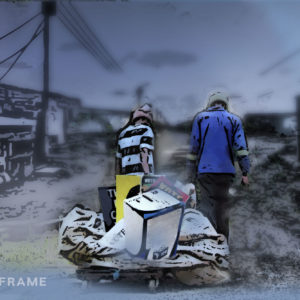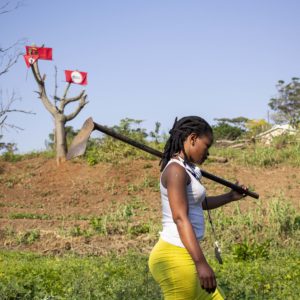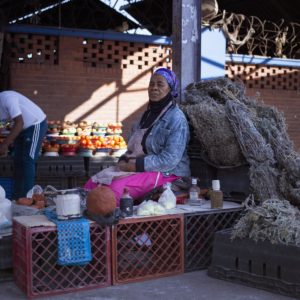Gqeberha bars new street traders in Korsten
The municipality won’t grant new trading licences for six months while it assesses the Korsten market area for redevelopment. Traders say it has made – and broken – such promises before.
Author:
1 December 2021

The new Nelson Mandela Bay Municipality council has put into effect a moratorium on permits for new street traders at the Korsten market in Gqeberha. Originally agreed in late August, the new ANC-led council put the moratorium into effect immediately for six months. Ostensibly, it will run until late May.
The decision is part of an integrated “multi-stakeholder” plan, the core objective of which is to create sustainable solutions for the sector, according to the municipality.
“The moratorium is meant to ultimately improve the Durban Road trading area for traders and consumers alike. This will give the municipality and all stakeholders in that area an opportunity to do an in-depth baseline analysis that will be used as a blueprint to improve the trading area,” said municipal spokesperson Kupido Baron.
Related article:
The municipality has been in ongoing talks with traders at the Korsten market since 2018. It established the Korsten Trading Area Forum to regulate its planned revamp of the congested and polluted central business district. Baron said the forum will engage with formal and informal businesses in Korsten on “the how part” of the redevelopment.
This approach has yielded some results, but it has failed to address certain frustrations among street traders. “Permits used to take months to be approved, but since our engagements with the municipality, now it takes a few days. They have even given us the application forms so we can help our fellow traders to apply,” said Ntombomzi Sandla, 50, chairperson of the street traders’ representative body Isibane Sabathengisi.
Street traders established Isibane Sabathengisi so they could speak with a united voice about the challenges they face. Despite the gains made on permits, Sandla says they don’t get adequate support from the municipality, even though they contribute to the economy.
Years of struggle
In Korsten, Gqeberha’s oldest central business district, vendors say they are squeezed in next to each other. Major challenges include not being provided with temporary structures, storage containers or government funding, which has caused a decline in trade. “You’ll see people [traders] today and tomorrow you won’t see them,” said Sandla.
“We were once called to a meeting where a municipality employee came to take down the number of street vendors. After that, we have not heard from them.
“Funding is a challenge because there is no grant that is specifically for informal traders. We don’t meet the criteria for funding, and we don’t have a tax number and business plan. This robs us because we use our last cents to buy tomatoes, pay school fees and transport,” she said.
Related article:
Sandla has been selling tomatoes and potatoes in the Korsten market for well over 20 years. Sitting on a bucket, weathering heavy rain under an umbrella, she reflected on the years that traders have struggled to stay afloat. “The municipality is moving slowly. They should at least have given us temporary structures that won’t obstruct shops or the pavements.”
It was only in 2018 that the traders met with municipal officials to discuss the redevelopment of Korsten. Overjoyed at the time, they now say the municipality has not kept the promises it made then.
Discrimination and funding
South African vendors are pleased with the new permit system, but migrants from Africa say they find it prejudicial. Sabanima Fransciouse, who fled Burundi with her four children during the violence there, has been living in South Africa for more than 11 years. She has spent 10 of those years working as a street vendor, selling footwear from an oversized blue tent.
Fransciouse says her biggest worry is the lack of approval of her trading permit for more than a year and a half. She submitted her application in April 2020. Fransciouse rents a stall from a South African with a permit, so “I have to pay her every month and sometimes I don’t make much. We want the government to please help us refugees. It is hard for us. Our children attend school here.”
Related article:
The municipality denied any prejudice against migrants. “Our informal trading office does not treat foreign nationals with refugee or asylum status with prejudice. If there are any with correct papers in Korsten that feel as such, they can contact the ward councillor’s office to arrange a session to deal with that unfortunate perception. Our informal database does contain foreign nationals who are legally in the country,” said Baron.
The South African Informal Traders Alliance (Saita) has been mobilising street traders across the country since 2013. It represents nine provincial traders’ representative bodies, one of which is Isibane Sabathengisi.
During its inception, the alliance highlighted street traders’ contribution to South Africa’s economy. “It is a given that the informal business economy has until now not enjoyed the fruits of acknowledgement and respect for its roles in entrepreneurial exposure, job creation and poverty alleviation. This perception we aim to change. Likewise, we remain painfully aware of the many injustices in terms of evictions and confiscations our individual members are routinely subjected to at the hands of law enforcement agencies. We now say emphatically, no more,” said Saita president Rosheda Muller.



